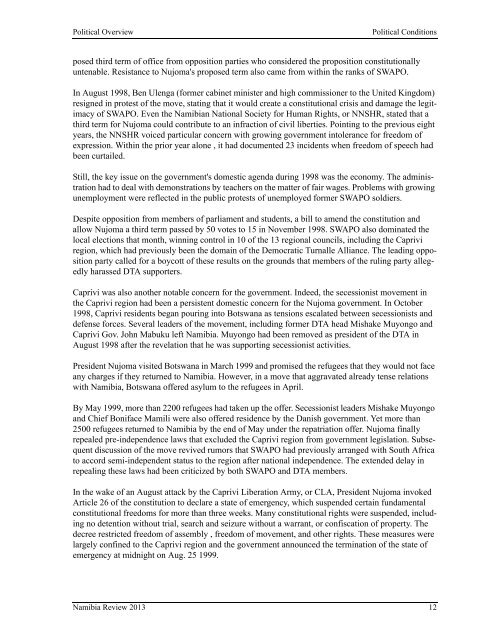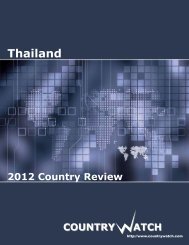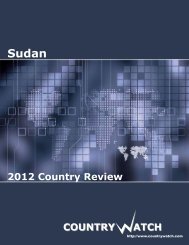Namibia - CountryWatch
Namibia - CountryWatch
Namibia - CountryWatch
Create successful ePaper yourself
Turn your PDF publications into a flip-book with our unique Google optimized e-Paper software.
Political Overview Political Conditions<br />
posed third term of office from opposition parties who considered the proposition constitutionally<br />
untenable. Resistance to Nujoma's proposed term also came from within the ranks of SWAPO.<br />
In August 1998, Ben Ulenga (former cabinet minister and high commissioner to the United Kingdom)<br />
resigned in protest of the move, stating that it would create a constitutional crisis and damage the legitimacy<br />
of SWAPO. Even the <strong>Namibia</strong>n National Society for Human Rights, or NNSHR, stated that a<br />
third term for Nujoma could contribute to an infraction of civil liberties. Pointing to the previous eight<br />
years, the NNSHR voiced particular concern with growing government intolerance for freedom of<br />
expression. Within the prior year alone , it had documented 23 incidents when freedom of speech had<br />
been curtailed.<br />
Still, the key issue on the government's domestic agenda during 1998 was the economy. The administration<br />
had to deal with demonstrations by teachers on the matter of fair wages. Problems with growing<br />
unemployment were reflected in the public protests of unemployed former SWAPO soldiers.<br />
Despite opposition from members of parliament and students, a bill to amend the constitution and<br />
allow Nujoma a third term passed by 50 votes to 15 in November 1998. SWAPO also dominated the<br />
local elections that month, winning control in 10 of the 13 regional councils, including the Caprivi<br />
region, which had previously been the domain of the Democratic Turnalle Alliance. The leading opposition<br />
party called for a boycott of these results on the grounds that members of the ruling party allegedly<br />
harassed DTA supporters.<br />
Caprivi was also another notable concern for the government. Indeed, the secessionist movement in<br />
the Caprivi region had been a persistent domestic concern for the Nujoma government. In October<br />
1998, Caprivi residents began pouring into Botswana as tensions escalated between secessionists and<br />
defense forces. Several leaders of the movement, including former DTA head Mishake Muyongo and<br />
Caprivi Gov. John Mabuku left <strong>Namibia</strong>. Muyongo had been removed as president of the DTA in<br />
August 1998 after the revelation that he was supporting secessionist activities.<br />
President Nujoma visited Botswana in March 1999 and promised the refugees that they would not face<br />
any charges if they returned to <strong>Namibia</strong>. However, in a move that aggravated already tense relations<br />
with <strong>Namibia</strong>, Botswana offered asylum to the refugees in April.<br />
By May 1999, more than 2200 refugees had taken up the offer. Secessionist leaders Mishake Muyongo<br />
and Chief Boniface Mamili were also offered residence by the Danish government. Yet more than<br />
2500 refugees returned to <strong>Namibia</strong> by the end of May under the repatriation offer. Nujoma finally<br />
repealed pre-independence laws that excluded the Caprivi region from government legislation. Subsequent<br />
discussion of the move revived rumors that SWAPO had previously arranged with South Africa<br />
to accord semi-independent status to the region after national independence. The extended delay in<br />
repealing these laws had been criticized by both SWAPO and DTA members.<br />
In the wake of an August attack by the Caprivi Liberation Army, or CLA, President Nujoma invoked<br />
Article 26 of the constitution to declare a state of emergency, which suspended certain fundamental<br />
constitutional freedoms for more than three weeks. Many constitutional rights were suspended, including<br />
no detention without trial, search and seizure without a warrant, or confiscation of property. The<br />
decree restricted freedom of assembly , freedom of movement, and other rights. These measures were<br />
largely confined to the Caprivi region and the government announced the termination of the state of<br />
emergency at midnight on Aug. 25 1999.<br />
<strong>Namibia</strong> Review 2013 12




